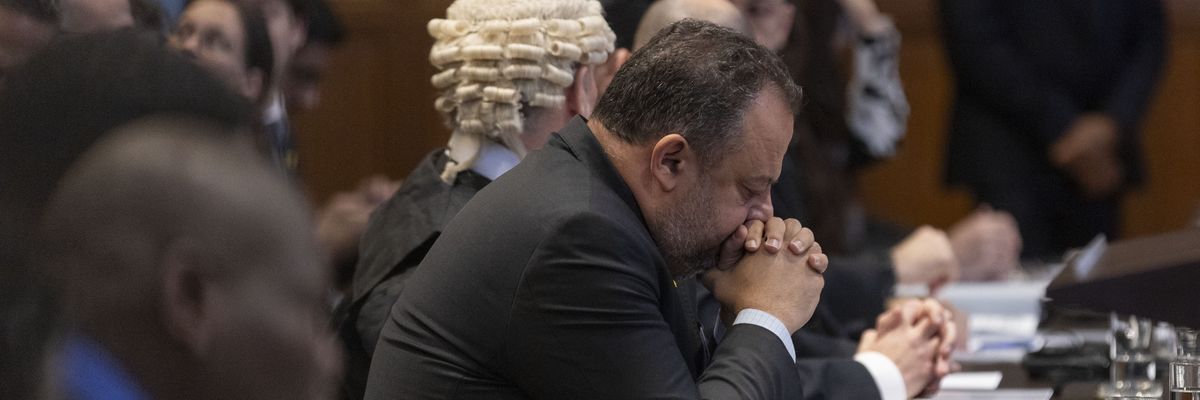
Israeli legal counselor Tal Becker is pictured during the International Court of Justice hearing on January 11, 2024 in The Hague, Netherlands.
Watch: 22-Minute Speech Details Israeli Officials' Genocidal Statements at ICJ
"The evidence of genocidal intent is not only chilling, it is also overwhelming and incontrovertible."
South African attorney Tembeka Ngcukaitobi on Thursday used the words of Israeli Prime Minister Benjamin Netanyahu and other high-ranking officials to make the case to the International Court of Justice—and to the world—that Israel's military is acting with clear genocidal intent in the Gaza Strip.
"Let the prime minister's words speak for themselves," said Ngcukaitobi, pointing to Netanyahu's November remarks urging Israelis to "remember what Amalek has done to you. Netanyahu has repeatedly likened Gazans to the Amalekites, whom the Old Testament God orders King Saul to massacre.
Ngcukaitobi went on to cite the deputy speaker of the Israeli Knesset, who called on Israel's military to "burn Gaza" to the ground—a statement he reiterated ahead of Thursday's hearing at the United Nations' highest court.
"There is an extraordinary feature in this case: that Israel's political leaders, military commanders, and persons holding official positions have systematically and in explicit terms declared their genocidal intent," said Ngcukaitobi. "And these statements are then repeated by soldiers on the ground in Gaza as they engage in the destruction of Palestinians and the physical infrastructure of Gaza."
The South African attorney played video footage of Israeli soldiers dancing and chanting that there are "no uninvolved civilians" in Gaza—a precursor to the war crime of collective punishment.
Watch Ngcukaitobi's full speech:
South Africa's 84-page filing at the ICJ contains nine pages of statements from Israeli officials that, according to the South African legal team, signal "genocidal intent against the Palestinian people."
Intent, as the U.N. has emphasized, is "the most difficult element to determine."
"To constitute genocide, there must be a proven intent on the part of perpetrators to physically destroy a national, ethnical, racial, or religious group," the U.N. explains in a summary of the Genocide Convention, which Israel stands accused of violating.
But Ngcukaitobi argued Thursday that Israeli officials' explicit calls for the decimation of Gaza and its population leave no question that the Israeli government's assault on the Palestinian enclave is genocidal.
"Many propagators of grave atrocities have protested that they were misunderstood, that they did not mean what they said, and that their own words were taken out of context," Ngcukaitobi said, preempting a possible Israeli line of defense. "What state would admit to a genocidal intent? Yet the distinctive feature of this case has not been the silence as such but the reiteration and repetition of genocidal speech throughout every sphere of state in Israel."
"We remind the court of the identity and authority of the genocidal inciters: the prime minister, the president the minister of defense, the minister of national security, the minister of energy and infrastructure, members of the Knesset, senior army officials, and foot soldiers," Ngcukaitobi continued. "The evidence of genocidal intent is not only chilling, it is also overwhelming and incontrovertible."
Trita Parsi, executive vice president of the Quincy Institute for Responsible Statecraft, wrote in response to Ngcukaitobi's presentation that "decades of the U.S. insulating Israel from any accountability has led to this moment: Israeli leaders have thought they are so untouchable that they have openly declared the genocidal intent of their policies."
"But South Africa is now using Israeli leaders' own words to convict them at the ICJ," Parsi added.




Geen opmerkingen:
Een reactie posten